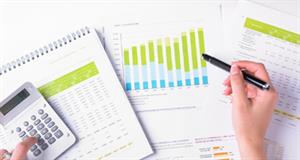Young CPAs: You Know Retirement Saving Should Start Now
About 95 percent of people ages 21 to 32 are not saving adequately for retirement. Young CPAs are no exception to needing a retirement savings reminder. Here are some best practices to help young CPAs navigate the financial challenges they’ll face early in their careers and still prepare a nest egg.
 By Mark Thomas, CLU, ChFC
By Mark Thomas, CLU, ChFC
About 95 percent of people ages 21 to 32 aren’t saving adequately for retirement, according to recent research by the National Institute on Retirement Security. And though they’ve spent years amassing financial knowledge in school, young CPAs are no exception to needing a retirement savings reminder.
The following best practices can help young CPAs navigate the financial challenges they’ll face early in their careers and ensure they’re equipped with savvy habits and tools for long-term financial health into retirement.
 Set a budget and stick to it. Setting a budget is the top way young CPAs can smartly manage their finances and save. Tracking fixed expenses – like a cell phone bill, car insurance, student loan payments, and rent or a mortgage – is straightforward. The true value of setting a budget is getting an accurate picture of how disposable income is being spent. The results are often surprising.
Set a budget and stick to it. Setting a budget is the top way young CPAs can smartly manage their finances and save. Tracking fixed expenses – like a cell phone bill, car insurance, student loan payments, and rent or a mortgage – is straightforward. The true value of setting a budget is getting an accurate picture of how disposable income is being spent. The results are often surprising.
Budgeting and tracking expenditures is easy with apps like Mint. They can help young CPAs set and stick to a budget. It’s advisable to track how disposable income is spent for six months to get a comprehensive idea of spending patterns. With that accurate picture, it becomes much easier to determine where to cut back to increase savings or cut down debt.
Create an emergency cash fund. Unexpected expenditures will arise, and they can send a young CPA down a dangerous path if they aren’t prepared. For example, if a CPA has a $2,500 health plan deductible and is involved in a skiing accident that results in a $10,000 medical bill, without money set aside for an emergency, that $2,500 has to be borrowed or charged to a credit card.
Consolidate debt to maximize your dollar. For CPAs with student loans, an auto loan, and credit card balances, consolidating debt at a favorable interest rate can be a smart technique to reduce debt. However, reducing payments can give a false sense that it’s okay to get another credit card or to finance something else. Instead, save that money for the future, and follow the financial rule of thumb of keeping your debt ratio below 30 percent.
Don’t throw your money away. Paying bills on time is a good habit to get into, and it is an easy way young CPAs can be smart with their money. Paying late only means wasting money on fees. Paying on time can also help credit scores, which will help qualify for the best interest rates.
Set savings goals. Younger CPAs should have a mix of short-term and long-term savings goals. Short-term goals include things like a trip abroad or purchasing a new computer. Saving for a trip or big purchase, instead of charging it, will help recuse costs as money won’t be wasted on interest charges.
Long-term goals are just as important. Many financial advisers say college graduates entering the workforce today will not have a defined benefit retirement plan (a retirement plan provided by the employer where the longer you work for them the more they set aside for you, and then you have a guaranteed income for the remainder of your retirement years). Instead, most employers today offer a defined contribution plan, such as a 401(k), and will match a percentage of your savings. At the very least, if your employer offers a match up to 6 percent of your income, for example, you should be contributing 6 percent of your income to your 401(k), otherwise you are giving away money. However, most retirement experts think young employees should save 18 percent to 20 percent of income to build the right amount of assets for retirement. Perhaps start with 5 percent, work on your budget, reduce your debt, and then increase your savings to 10 percent or 15 percent. Try exploring financial websites and plug some figures into a retirement calculator. You might be surprised at what it takes to plan for a secure retirement.
Save your bonus, or at least use it wisely. Many young CPAs’ first inclination when they receive a bonus is to spend the money on a “reward” purchase, like a new car. A savvier decision would be to save the bonus and pretend like it never existed. Alternatively, spend the bonus money wisely and pay down debt.
Mark Thomas, CLU, ChFC, is senior vice president with Aon Affinity’s AICPA member insurance programs. He can be reached at mark.thomas@aon.com.
PICPA Staff Contributors
Disclaimer
Statements of fact and opinion are the authors’ responsibility alone and do not imply an opinion on the part of PICPA officers or members. The information contained in herein does not constitute accounting, legal, or professional advice. For professional advice, please engage or consult a qualified professional.






